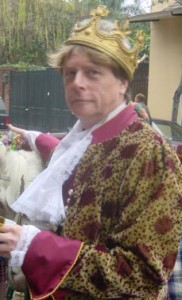 Love and Existentialism in New Orleans: A Retrospective Review of The Moviegoer
Love and Existentialism in New Orleans: A Retrospective Review of The Moviegoer
“On this my thirtieth birthday, I know nothing and there is nothing to do but fall prey to desire.” So says Binx Bolling, the ironical hero of Walker Percy’s novel The Moviegoer. At one time, Walker Percy was a literary superstar. The Moviegoer, his first book, was published in 1961 to glowing reviews, and it won the National Book Award that year, establishing Percy as one of the foremost voices of Southern literature. Since then, the novel has been included on numerous “best novels of the century”-type lists. Yet whenever I mention Percy’s name to friends today, nobody seems to have heard of him (except those in Catholic literary circles, for reasons that will perhaps become clearer below). I’m here to say that this is a crying shame.
The Moviegoer fuses the philosophical complexity and spiritual intensity of a Russian novel with the Southern tradition of the “familial decline” plot. Think Dostoyevsky meets Faulkner. Binx Bolling is a boyish thirty-year-old from a genteel New Orleans family who could do virtually anything that he wants with his life—and yet, faced with such freedom, he chooses to live in a featureless suburb, selling stocks and frittering his time away with pretty secretaries. His step-cousin Kate is similarly aimless, caught in a dialectic of mania and depression caused in part by her overbearing mother, Binx’s aunt. When this aunt puts pressure on Binx to make something more of his life, it forces a crisis that sends him and Kate careening on an ill-advised Mardi Gras journey.
For one thing, Percy’s prose is scintillating, some of the most finely tuned I have ever had the pleasure to read. He depicts the subtleties of landscapes and scenery with a painterly attention to detail: “A mare’s tail of cirrus cloud stands in high from the Gulf. High above the Lake a broken vee of ibises points for the marshes; they go suddenly white as they fly into the tilting salient of sunlight.” (Given Percy’s frequent attention to the qualities of light and atmosphere as well as his spiritual themes, it’s not a surprise that filmmaker Terrence Malick almost made a screen adaptation of The Moviegoer.) Percy has a talent for finding the exact metaphor or simile that, when you read it, convinces you that no other metaphor or simile would possibly do, as in “The blue boat rides up and down the bayou, opening the water like a knife.”
Physical description may be the lowest rung of mastery for a writer, but Percy brings the same level of acuity and subtlety to his observations of human character. For instance, Binx observes about his cousin’s fiancée: “What is funny is that Walter always starts out in the best brilliant-young-lawyer style of humoring an old lady by letting her get the better of him, whereas she really does get the better of him.” In a dinner-table scene involving Binx’s family, every gesture and line of dialogue seems to reveal some new element of the intricate subtext. Even in the briefest sketches, the most minor characters stand out as fully realized and lifelike:
“As he talks, he slaps a folded newspaper against his pants leg and his eye watches me and at the same time sweeps the terrain behind me, taking note of the slightest movement. A green truck turns down Bourbon Street; the eye sizes it up, flags it down, demands credentials, waves it on. A businessman turns in at the Maison Blanche building; the eye knows him, even knows what he is up to. And all the while he talks very well. His lips move muscularly, molding words into pleasing shapes, marshalling arguments, and during the slight pauses are held poised, attractively everted in a Charles-Boyer pout—while a little web of saliva gathers in a corner like the clear oil of a good machine. Now he jingles the coins deep in his pocket. No mystery here!—he is as cogent as a bird dog quartering a field. He understands everything out there and everything out there is something to be understood.”
But even more than Percy’s technical virtuosity, what I find most remarkable about him as a writer is his existential audacity, the boldness and originality of his intellectual vision. He is ever attentive to the particularities of history and geography, yet in The Moviegoer, he also dares to stride right past such temporal concerns to grapple with perhaps the most fundamental question faced by conscious being: How does one deal with the freedom of one’s own existence? This, in fact, seems to be the whole point of “the search,” an idea that recurs to Binx throughout the novel. Binx has a whole private lexicon of terms that seem ripped right out of Kierkegaard (e.g. “repetition,” “the malaise”) to describe his little phenomenological “researches.” Both he and Kate are acutely aware of the flimsiness of the solutions that modern society offers them—Binx claims his “only talent” is “a good nose for merde, for every species of shit that flies,” and Kate pokes fun at the shallow pedantry of her therapist, whose name, Merle, is suspiciously close to merde. What they’re dealing with is an emotional-intellectual problem that, as Kate describes it, is beyond the pale of 1960s psychotherapy:
“[Merle] got interested and suggested we look at the reasons. I said, Merle, how I wish you were right. How good to think that there are reasons and that if I am silent, it means I am hiding something. How happy I would be to be hiding something. And how proud I am when I do find secret reasons for you, your own favorite reasons. But what if there is nothing? That is what I’ve been afraid of until now—being found out to be concealing nothing at all.”
Percy is an ironist and a contrarian who takes pleasure in puncturing the banal pieties of his day, especially those of educated society. In one of the most hilarious passages, Binx lampoons a radio program called This I Believe in which high-minded celebrities state their personal credos. “If I had to name a single trait that all these people shared,” Binx says, “it is their niceness. Their lives are triumphs of niceness. … Everyone on This I Believe believes in the uniqueness and dignity of the individual. I have noticed, however, that the believers are far from unique themselves, are in fact alike as peas in a pod.” By the end of The Moviegoer, it becomes clear that Percy’s primary satirical target is a kind of shallow, toothless scientific humanism that is replacing people’s ability to independently contemplate the meaning and purpose of their own lives. It is a brave new vision of the world in which “needs are satisfied, everyone becomes an anyone, a warm and creative person, and prospers like a dung beetle, and one hundred percent of people are humanists and ninety-eight percent believe in God, and men are dead, dead, dead.”
Percy converted to Catholicism when he was about 30 years old, and Catholicism is present in a muted fashion throughout the book. But the novel rarely comes across as preachy, at least not in a religiously sectarian sense. I first read The Moviegoer when I was still nominally Catholic but teetering on the edge; the second time I read it, I was a non-religious agnostic. But if anything, I liked the novel even better the second time around. If the foregoing rant against scientific humanism sounds a tad reactionary, it’s worth noting that Binx is just as alienated from the thoughtless, conventional Catholic piety of his mother’s family as from the lofty universalist sentiments of his father’s. Percy never clearly comes down in support of any particular creed; Catholicism is just one more phenomenon that Binx is trying to make sense of as part of his existential search.
The book does, however, have a tendency to wax philosophical; if you don’t like your fiction with large doses of existential musing, then The Moviegoer is probably not for you. Reportedly, Percy’s later novels became increasingly dark and didactic (though probably no more so than, say, Sartre’s or Dostoyevsky’s). Perhaps this later didactism accounts for his relative obscurity today. I cannot vouch for the later work, but I can attest that The Moviegoer, at least, is a masterpiece of American literature that feels every bit as relevant in today’s fragmented, decentered social world as it must have in 1961. For any craft-conscious writer, or for any reader who enjoys dwelling on existential themes, this book is not to be missed.
